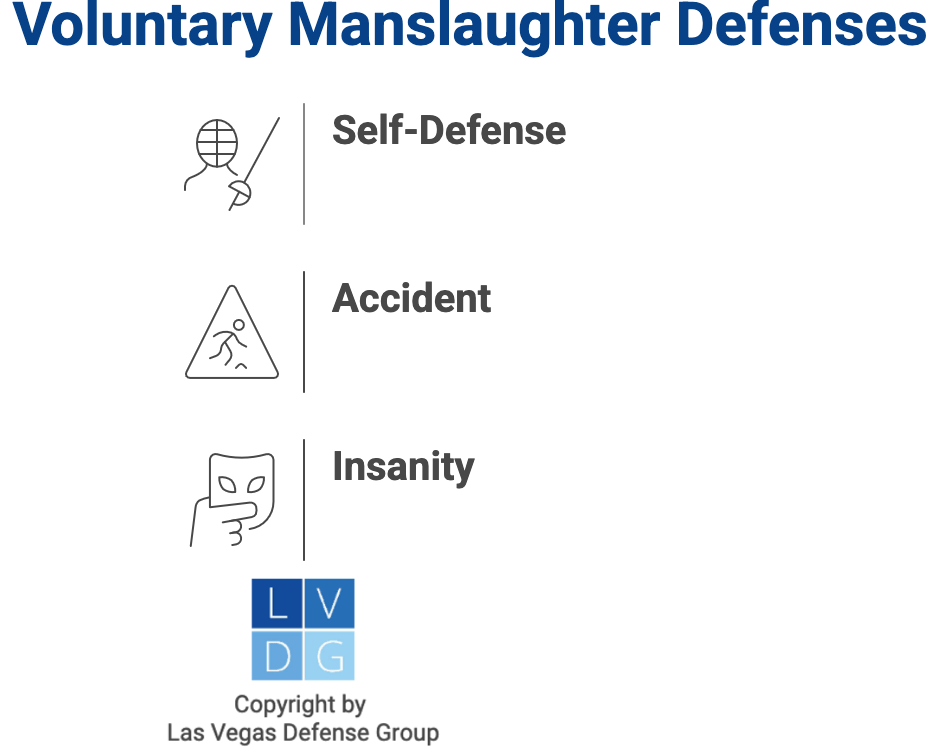Nevada Revised Statute § 200.050 makes it a category B felony to commit voluntary manslaughter, which is killing another person in the heat of passion but with no premeditation. The penalties for voluntary manslaughter are one to 10 years in Nevada State Prison and up to a $10,000 fine.

In this article, our Las Vegas criminal defense attorneys will address the following key issues regarding voluntary manslaughter:
- 1. Elements of NRS 200.050
- 2. Defenses
- 3. Record Seals
- 4. Deportation
- 5. Related Offenses
- Frequently-Asked-Questions
- Additional Reading

NRS 200.050 comprises “heat of passion” killings.
1. Elements of NRS 200.050
For you to be convicted of voluntary manslaughter in Nevada, prosecutors have to prove beyond a reasonable doubt the following three elements:
- You intentionally killed someone,
- You killed in response to such a significant provocation that any reasonable person in your shoes would have felt a similar passion or rage, and
- The killing occurred right after you were provoked.1
The classic example of voluntary manslaughter is when a husband unknowingly walks in on his wife in bed with someone else, and the husband promptly pounces on the other man and fatally wounds him “in the heat of passion.” Being betrayed by a life partner is one of the most painful human experiences, and any reasonable person might feel an immediate violent impulse.2
What makes voluntary manslaughter a less serious charge than first-degree murder is that first-degree murder requires premeditation and deliberation. Even if only a few seconds pass between the provocation and the killing, a jury may decide that you “cooled off” and had the mental ability to premeditate murder.3
Example: Charlie walks into his bedroom and is shocked to find his wife in bed with another man. Charlie then runs to his closet, takes out his pistol, loads it, and shoots the other man. In this case, Charlie would likely be liable for murder rather than manslaughter because getting and loading a gun shows premeditation.
Had Charlie been holding a loaded gun when he walked in on his wife cheating and then immediately shot the boyfriend, Charlie might be able to avoid murder charges. This is because there would have been no cooling off period between discovering the betrayal and pulling the trigger.
Depending on the case, it may be possible to get murder charges reduced to voluntary manslaughter as part of a plea bargain.

There is no such thing as “attempted manslaughter” because an “attempt” implies acting with deliberation and malice, which are not elements of manslaughter.
2. Defenses
Here at Las Vegas Defense Group, we have represented countless people accused of homicide, including voluntary manslaughter. In our experience, the following three defenses have been very effective with prosecutors, juries, and judges at getting NRS 200.050 charges dropped or lessened.
1) You Acted in Lawful Self-Defense
Nevada law permits you to kill in order to protect yourself or others from immediate death or bodily harm.
Example: Alice and Betty are strippers. A drunk patron is angry that Alice and Betty will not let him touch them. The patron then takes out his gun and points it towards Alice while screaming obscenities. Fearful for her and Betty’s lives, Alice immediately kicks the patron in the throat with her stiletto, killing him. Alice should not face homicide charges because she reasonably believed their lives were in immediate danger.
Note that self-defense applies only when you are acting reasonably under the circumstances. Had the patron in the above example not flashed a weapon, Alice would not have been justified in killing him.4
2) You Were Legally Insane
If you are accused of voluntary manslaughter, you may be found “not guilty by reason of insanity” if you were in a delusional state that prevented you from either:
- knowing or understanding the nature and capacity of your act or
- appreciating that your conduct was unlawful.5
This defense may be effective if you were suffering from severe mental illness, such as schizophrenia or bipolar disorder:
Example: Jeff has been diagnosed with bipolar disorder. One day while his caretaker is helping him walk upstairs, the caretaker loses his patience at Jeff’s manic state and screams, “Good God, why don’t you just kill me now and end my suffering!”
Taking his caretaker at his word, Jeff immediately pushes him down the stairs. In light of Jeff’s mental illness, a Nevada court would probably find that Jeff did not appreciate that his conduct was unlawful. Therefore, Jeff would probably escape a homicide conviction.
Note that if you are acquitted of homicide by reason of insanity, you will likely be committed to a mental institution.
Also note that it does not qualify as insanity if you were voluntary intoxicated.6
3) The Incident Was an Accident
Deaths that result from innocent accidents are not criminal. Unless you were acting negligently at the time of the killing, you should not face homicide charges for causing an accident.7
Example: Nick is beating his girlfriend Dana at their home. At one point, Dana manages to duck when Nick tries to headbutt her. However, this causes Nick to fall forward and hit his head on the marble floor, killing him.
Even though Dana was acting in the heat of the moment, she should not face manslaughter charges. Nick falling forward to his death was an unforeseeable accident and should not invite criminal prosecution.
No matter the circumstances, prosecutors in criminal cases have the burden to prove guilt beyond a reasonable doubt. As long as we can demonstrate that the D.A.’s evidence is too unreliable or inadequate to sustain a conviction, the court should drop the charges.8

Premeditation is what separates murder from manslaughter.
3. Record Seals
In Nevada, a voluntary manslaughter conviction can be sealed 10 years after the case closes.9 A case is “closed” after the entire sentence has been served, including parole and probation.
If the NRS 200.050 charge gets dismissed, then you can petition for a record seal immediately.10

Another possible defense to voluntary manslaughter is false accusations, which are often levied out of anger or revenge.
4. Deportation
Voluntary manslaughter is a crime involving moral turpitude and is therefore deportable.11 Non-citizens arrested for any homicide charge are advised to retain a lawyer right away to try to get the case dismissed or reduced to something non-deportable.
5. Related Offenses
| Nevada Homicide Offenses | Main Elements |
| First-degree murder (NRS 200.030) | Premeditated killing with malice aforethought. |
| Second-degree murder (NRS 200.030) | An unintentional killing with malice aforethought caused by behavior so reckless you should have known that death would likely result. |
| Felony-murder (NRS 200.030) | A killing that occurs during the commission of either arson, robbery, burglary, home invasion, kidnapping, child abuse, elder abuse, sexual abuse of a child, and/or rape. |
| Involuntary Manslaughter (NRS 200.070) | Unintentional killing through negligence. |
| Attempted Murder (NRS 200.030) | Trying to kill someone but failing. |
| Capital Murder (NRS 200.033) | First-degree murder when there is at least one aggravating circumstance that outweighs any mitigating ones. |
| Vehicular Manslaughter (NRS 484B.657) | Killing someone by negligent driving. |
| Vehicular Homicide (NRS 484C.130) | Causing a fatal DUI following at least three prior DUI convictions. |
| Feticide (NRS 200.210) | Killing an unborn child outside of a licensed abortion clinic. |
| Death by Drugs (NRS 453.333) | Unlawfully giving someone drugs that cause their death. |
Note that voluntary manslaughter is a crime under federal law as well under 18 U.S. Code § 1112. It carries up to 15 years in prison, which is five years more than the maximum penalty in Nevada.

The death penalty is not a potential penalty for manslaughter.
Frequently-Asked-Questions
What is the difference between voluntary manslaughter and murder in Nevada?
Voluntary manslaughter differs from murder in that it occurs without premeditation, deliberation, or malice aforethought. It happens in the heat of passion immediately after being provoked, whereas murder involves planning or deliberate intent to kill.
How long do I have to wait to seal a voluntary manslaughter conviction?
You must wait 10 years after your case ends (including completion of any sentence and probation) before you can apply to seal a voluntary manslaughter conviction record in Nevada.
What is the maximum penalty for voluntary manslaughter in Nevada?
The maximum penalty for voluntary manslaughter in Nevada is 1 to 10 years in state prison and up to a $10,000 fine. It is classified as a category B felony.
Can I be deported for a voluntary manslaughter conviction?
Yes, non-citizens can be deported for a voluntary manslaughter conviction as it is considered a crime involving moral turpitude under immigration law.
Additional Reading
For more in-depth information, refer to these scholarly articles:
- (Wo)Manslaughter: Voluntary Manslaughter, Gender, and the Model Penal Code – Emory Law Journal.
- Are There Circumstances Other than Provocation which May Reduce Murder to Voluntary Manslaughter – Kentucky Law Journal.
- What Future for Voluntary Manslaughter? – The Journal of Criminal Law.
- Manslaughter and the Adequacy of Provocation: The Reasonableness of the Reasonable Man – University of Pennsylvania Law Review.
- The psychology and law of voluntary manslaughter: what can psychology research teach us about the “heat of passion” defense? – Behavior Decision Making.
- Some Provoking Aspects of Voluntary Manslaughter Law – Common Law World Review.
See our related articles: Manslaughter v. Murder – The Law in Nevada and Justifiable Homicide under NRS 200.120.
Legal References
- NRS 200.040 – “Manslaughter” defined.
1. In cases of voluntary manslaughter, there must be a serious and highly provoking injury inflicted upon the person killing, sufficient to excite an irresistible passion in a reasonable person, or an attempt by the person killed to commit a serious personal injury on the person killing.
2. Voluntary manslaughter does not include vehicular manslaughter as described in NRS 484B.657.NRS 200.050 – “Voluntary manslaughter” defined.
1. In cases of voluntary manslaughter, there must be a serious and highly provoking injury inflicted upon the person killing, sufficient to excite an irresistible passion in a reasonable person, or an attempt by the person killed to commit a serious personal injury on the person killing.
2. Voluntary manslaughter does not include vehicular manslaughter as described in NRS 484B.657.
Newson v. State (2020) 462 P.3d 246. Hancock v. State (1964) 80 Nev. 581 (“The crime of manslaughter does not require the specific intent to kill…”). NRS 200.080. - Roberts v. State (1986) 102 Nev. 170 (“The crime of voluntary manslaughter is defined and described in NRS 200.040, NRS 200.050 and NRS 200.060, the pertinent language being set forth in the margin. It appears that there is some evidence in this case to support a jury finding that the crime of manslaughter had been committed. Indeed, the trial judge himself observed that the jury could have inferred that the defendant was acting in the heat of passion. That there is evidence to support a finding of the “sudden” nature of the passion cannot be gainsaid. NRS 200.040 requires that the “sudden heat of passion” be caused by “a provocation apparently sufficient to make the passion irresistible.” NRS 200.050 additionally defines sufficient provocation in terms of a “serious and highly provoking injury inflicted upon the person killing.”…As indicated, the defendant and the victim had a long-standing relationship. He continued after their separation to provide her with financial support and to see her romantically. He said that he considered the victim and her children to be his family. The day of the killing was to a large degree dedicated to her convenience. He had taken a half day off from his job to furnish her son with a truck. He ran an errand for her and expected to spend that evening with her. He would have been justified in viewing her “standing him up” as a callused insult, greatly aggravated by her taking up sexually with another man on the night of his planned get-together with her. It is not unreasonable to infer from such circumstances that his discovery provoked him into a sudden and excessive anger or “heat of passion,” as the statute reads.”). See State v. Fisko (1937) 58 Nev. 65, 70 P.2d 1113 (“It is not every assault that reduces murder to manslaughter…And the provocation must be great where a deadly weapon is used.”). Curry v. State (1990) 106 Nev. 317 (“By definition, [violating NRS 200.050] is a general intent crime. One cannot logically specifically intend to act pursuant to a spontaneous, unanticipated and therefore, truly irresistible passion. An “attempt,” as defined in NRS 193.153, is a specific intent crime. The accused must formulate a specific intent to commit the crime attempted. See Bailey v. State (1984) 100 Nev. 562. We further defined the intent necessary for an attempted crime in Keys v. State, (1988) 104 Nev. 736, 766 P.2d 270, when we stated: An attempt, by nature, is a failure to accomplish what one intended to do. Attempt means to try; it means an effort to bring about the desired result. Thus one cannot attempt to be negligent or attempt to have the general malignant recklessness contemplated by the legal concept, “implied malice” (emphasis in original). Id. at 740, 766 P.2d at 273. The crime of attempted voluntary manslaughter is therefore an illogical illusion.”).
- NRS 200.060 When killing punished as murder.
The killing must be the result of that sudden, violent impulse of passion supposed to be irresistible; for, if there should appear to have been an interval between the assault or provocation given and the killing, sufficient for the voice of reason and humanity to be heard, the killing shall be attributed to deliberate revenge and punished as murder.
Collins v. State (2017) 405 P.3d 657 (“It may be questioned whether [violating NRS 200.050] qualifies under the elements test as a lesser-included offense of murder, given that murder does not have as one of its elements the provocation and passion voluntary manslaughter requires. But…existing case law…treats voluntary manslaughter as a lesser-included offense of murder.”); Allen v. State (1982) 98 Nev. 354 (“Voluntary manslaughter is defined by NRS 200.050 and NRS 200.060. It consists of a killing which is the result of a sudden, violent and irresistible impulse of passion. The law requires that the irresistible impulse of passion be caused by a serious and highly provoking injury, or attempted injury, sufficient to excite such passion in a reasonable person. If there is an interval between the provocation and the killing sufficient for the passion to cool and the voice of reason to be heard, the killing will be punished as murder. Jackson v. State, (1968) 84 Nev. 203 (“Whether the interval between the provocation and the killing is sufficient for the passions of a reasonable person to cool is not measured exclusively by any precise time. What constitutes a sufficient cooling-off period also depends upon the magnitude of the provocation and the degree to which passions are aroused…The distance between the scene of the fight at the pickup truck to Jackson’s car to which he walked after he was knocked to the ground by England and the time it took to go there, remove the rifle from his automobile, load and fire it, rules out the sudden irresistible impulse that makes up voluntary manslaughter.”). Graves v. State (1968) 84 Nev. 262, 439 P.2d 476 (“…this court has held that a trial court is justified in refusing to give an instruction on the crime of manslaughter if there is no evidence to support such an instruction…The presence of malice precludes an instruction on the crime of manslaughter.”). - Hill v. State (1982) 98 Nev. 295 (“The California Supreme Court held that if a defendant entertained an honest, but unreasonable, belief in the necessity of self-defense, at most he could be convicted only of manslaughter, since such a belief is inconsistent with and negates malice, an element of murder. We reject this “imperfect self-defense” theory because, unlike California’s statutory scheme, NRS 200.040 and NRS 200.050 provide an express restriction on the situations giving rise to voluntary manslaughter.”).
- Finger v. State (2001) 117 Nev. 548 (“In order to be considered legally insane under M’Naghten, a defendant must labor under a delusion so great that he is incapable of appreciating his surroundings. This delusion must do one of two things: (1) rob the defendant of the ability to understand what he is doing; or (2) deprive the defendant of the ability to appreciate that his action is wrong, that is, not authorized by law.”).
- State v. Fisko (1937) 58 Nev. 65 (“While the authorities are not all agreed, the great weight thereof in this country is to the effect that mere intoxication cannot reduce murder to manslaughter.”).
- See NRS 200.010–060.
- NRS 175.191.
- NRS 179.245.
- NRS 179.255.
- INA § 237(a)(2)(A).

